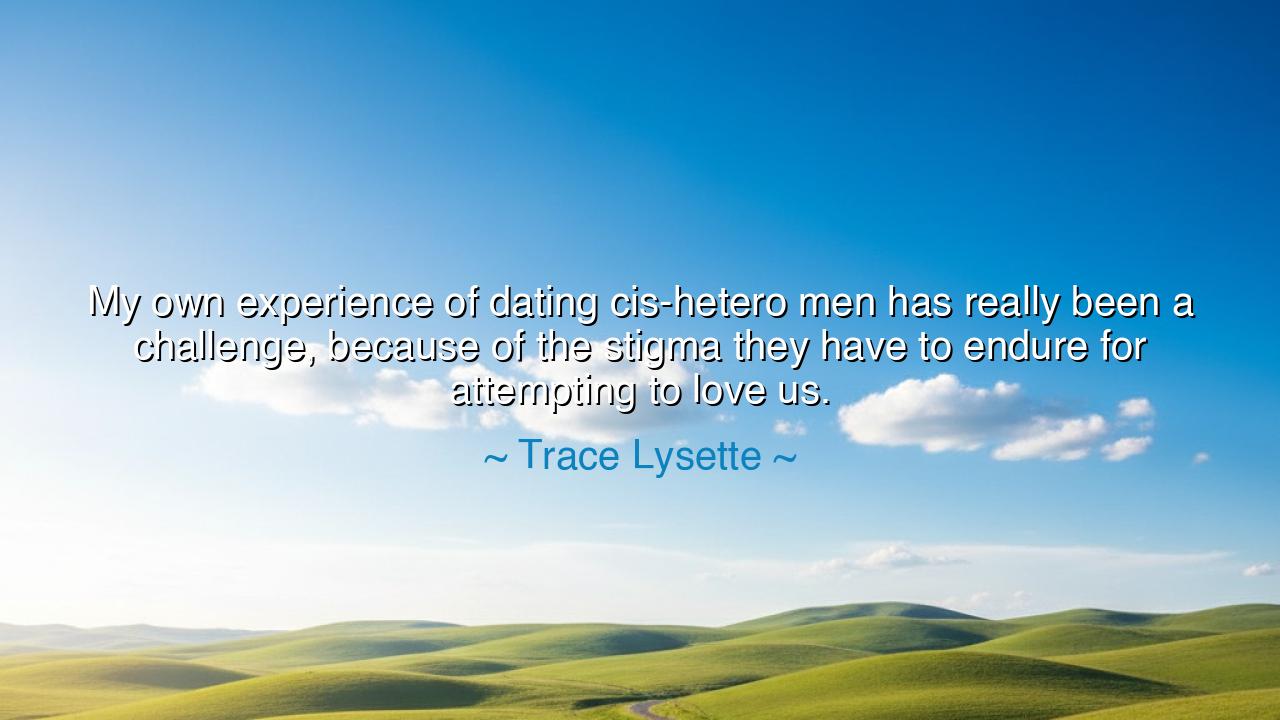
My own experience of dating cis-hetero men has really been a
My own experience of dating cis-hetero men has really been a challenge, because of the stigma they have to endure for attempting to love us.






In the words of Trace Lysette, “My own experience of dating cis-hetero men has really been a challenge, because of the stigma they have to endure for attempting to love us.” — there burns a truth both personal and universal, born of courage and pain. It is a statement that pierces beyond the realm of romance into the heart of society’s oldest battle: the struggle between love and fear, between the yearning to connect and the forces that seek to divide. In these few words, Lysette speaks not only for herself, but for all who have been made to feel that love must apologize for existing. Her confession is the song of every soul that has sought tenderness in a world that punishes difference.
At its surface, the quote reflects the reality faced by trans women and the cisgender men who love them — a love complicated not by nature, but by stigma, by the weight of other people’s judgment. Yet beneath this particular truth lies a far older and wider story, one known to every age: that the heart’s highest calling is often met with the world’s harshest resistance. To love openly what society forbids is, and always has been, an act of rebellion — a sacred defiance. From the dawn of civilization, those who have chosen authenticity over approval have walked the hardest path. Lysette’s words belong to that lineage — a lineage of those who love in the light, even when the world demands they remain in shadow.
The ancients, too, understood this tension. Consider the tale of Antigone, the daughter of Oedipus, who defied her king and her society to honor what she believed was right — the sacred duty to love and bury her brother. Her act was condemned as disobedience, yet it was love that guided her hand. So too, the man who dares to love a trans woman in a world that mocks or condemns him walks the path of Antigone: choosing love over law, heart over judgment. The stigma that Lysette speaks of is not just the world’s cruelty toward her, but its cowardice toward him — the fear that love might lead them both beyond the boundaries society has drawn.
When she speaks of the “challenge,” it is not the challenge of love itself — for love, in its pure form, asks nothing but honesty — but the challenge of carrying that love beneath the gaze of others. The cis-hetero man who reaches toward her must face whispers, scorn, and doubt — the world questioning his manhood for daring to see her humanity. And in that struggle, Lysette reveals the painful irony: that those who love most bravely are often the ones the world shames most cruelly. The wound, then, is double — both for the one who is loved and for the one who dares to love her.
History, too, offers mirrors of this truth. In the time of Rome, when the poet Catullus wrote his verses of forbidden passion, he declared, “I hate and I love — why I do so, perhaps you ask not.” He spoke to the torment of loving what others disapproved of, of the tension between desire and duty. In his time, as in ours, society measured men by conformity rather than compassion. Yet the poets, prophets, and visionaries have always known better: that love is not diminished by difference, but made divine by its courage. Trace Lysette’s words echo this same poetic defiance — the belief that love’s purity is measured not by who is loved, but by the strength it takes to love against the grain of expectation.
Her quote is, therefore, both lament and testament — a lament for the pain imposed by prejudice, and a testament to the enduring power of love to transcend it. The ancients taught that every act of courage begins in the heart’s decision to be true to itself. So too must love, if it is to be real, stand unflinching in the face of judgment. For what is bravery, if not the act of loving what others fear? In this way, Trace’s truth becomes a universal one: that love demands the strength to bear the world’s misunderstanding, and the grace to forgive it.
From her words, let us learn a lesson worthy of remembrance: love is never shameful when it is honest. The shame belongs only to those who mock what they cannot comprehend. We must learn to see, as the wise once did, that every form of love is a mirror of the divine — unique, sacred, and necessary. To the lovers who fear the world’s disapproval, take heart: the greatest revolutions in history have begun not with anger, but with affection — not with war, but with the courage to embrace. And to the world that still clings to its prejudices, let these words ring clear: no law, no label, no custom is stronger than the truth of two hearts choosing one another.
So may we remember this teaching, passed now from the lips of Trace Lysette to all generations: that the path of love is not always easy, but it is always holy. Love bravely. Stand beside those whom the world shuns. And when stigma rises like a wall between hearts, let compassion be the hammer that breaks it down. For as long as love endures, hope endures — and in that hope lies the redemption of us all.






AAdministratorAdministrator
Welcome, honored guests. Please leave a comment, we will respond soon